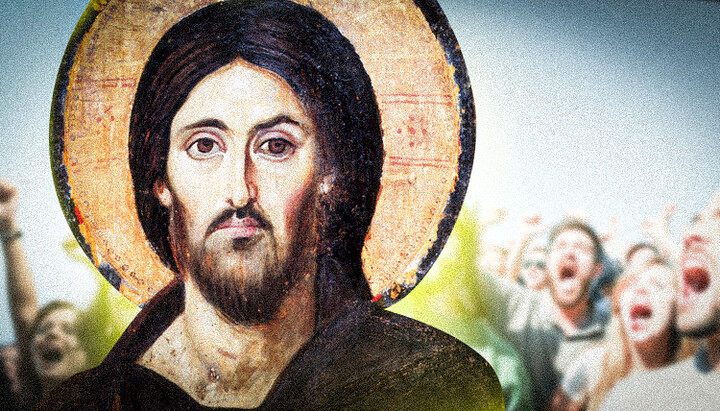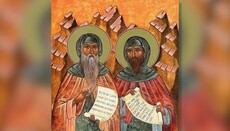To know God is not knowledge about God

The mirages of school theology will collapse immediately upon the arrival of death, which will shatter the shell of our fragile human conceptions of God.
The High Priestly Prayer is one of my favorite passages of the Holy Scripture. We read it during the liturgy on this Sunday. It is about our unity with God, about joy and love. That is, about what the soul lacks the most and what it most often strives for.
Eternal life, as characterized by the Savior Himself, is the knowledge of the One true God and Jesus Christ whom He sent. But what is this knowledge? In our understanding, knowledge is the sum of ideas taught at theological educational institutions. But one can ask a question to doctors. With all the knowledge that today's medicine provides us, can any scientist say what a human being is? We can describe the various mechanisms of human life, the functioning of internal organs, etc., but what is a human being in essence? No one knows this. What is a personality, how does it differ from individuality? What is human consciousness, and where is it found? Yet a human being is quite an accessible object for research and study, unlike God, whose essence is inaccessible even to the highest angelic powers.
Nevertheless, "the knowledge of God" for us is reduced to a rational analysis of sacred or patristic texts, logical conclusions, and intellectual interpretation of the studied material. Is this the knowledge of God that Christ speaks of in the High Priestly Prayer? Definitions, concepts with multifaceted shades of lexical meanings and individual perception are endless dark labyrinths through which the soul, blinded by egoism, wanders.
Eternal life implies not the knowledge of words about God, but the knowledge of God Himself. Just as the marriage between a husband and wife does not occur through studying books on anatomy and psychology, but through the immediate proximity of personal acquaintance. This is face-to-face communication. Only then does God begin to reveal Himself to us in a way we can understand and to the extent we can comprehend.
The spiritual practitioner differs from the theological theorist in that the former prays, while the latter reasons about God. The practitioner is immersed in inner silence, while the theorist is in external hustle. The former is always silent, while the latter continuously talks. The practitioner understands that to leave the world that lies in wickedness (1 John 5:19) means to leave the world of thoughts, the hell of desires, and enter the life of the Spirit, living by grace. The theorist plunges headlong into a world of harsh conflicts, depressing living conditions, he has no time for prayer, his entire life passes in exhausting hustle and many worries. At the same time, he may spend decades within the church enclosure, possibly even in holy orders, without seeing any fruits of the Holy Spirit in his soul and having not a drop of grace. Yet he sincerely believes he serves God. The practitioner, meanwhile, continuously abiding in the Holy Spirit, without any mental movements, fills his soul with grace, saves himself, and protects the whole world with the spiritual shield of unceasing prayer.
Most people who consider themselves professionals in the field of religion do not even suspect that all their ideas about God are nothing more than a play of imagination and fabrications of their own mind.
Our fantasies about God are not God, but merely an idol erected in our mind by our egoistic thinking. The knowledge of God requires from us, first of all, the presence of what makes us akin to God. That which opens the very possibility of having knowledge of God. That is, a person must first acquire the grace of the Holy Spirit, and only then come to know God in this grace. The presence of grace does not depend on intellectual abilities or mental potential. It is only interested in the purity of the heart and the humility of the soul.
The mirages of school theology will collapse immediately after the arrival of death, which will break the shell of our fragile human ideas about God. Because at the core of all these conclusions lies the foundation of proud delusions, mixed with ignorance and the loss of the meaning of life.
Then we will understand that without God there is and cannot be any "individual existence", and what we considered as such is an egoistic lie and fantasies of selfhood.
A sports commentator captures the smallest and seemingly insignificant events related to the athletes' game. A fisherman knows very well where, when, and what is best to catch fish. A cook knows the nuances of taste and ways of preparing certain products. A theologian knows all the features of the biblical text and its interpretation in other languages. He can tell how a particular passage of the Holy Scripture was understood by the holy fathers in different eras among different peoples. Each specialist will leave all this knowledge here on earth, as in another world it will no longer be needed.
And only the one who carefully watches over his mind, gathering it in the heart and not allowing thoughts to scatter and whirl around the world, will achieve the goal for which he came into this world. The theorist knows the difference between Manichaeans and Mandaeans, Borborites and Fatebenefratelli (Brothers Hospitallers of Saint John of God). But he may never know the tenderness that a simple illiterate grandmother knows, standing in tears and prayer before a simple paper icon of the Mother of God. Some knowledge replaces others, but only the grace of God remains unchanged and eternal. Everything born in this world sooner or later ages and dies, and only God remains eternally Young. Joy and love, dissolved with sorrow and mercy, attract God's mercy to us, which gives birth to sincere goodwill and compassion for all people without exception. Thus grace comes into the soul and joy appears in the Holy Spirit.
In such compassionate Love, our spirit awakens and transforms. A loving heart no longer divides the world into friends and enemies, into those who believe in God or who deny Him, it weeps for every person and cannot look without tears at the world perishing in sins. In the Church, there are more and more professionals in the field of religion.
The level of education, knowledge, skills, and abilities of seminarians and students of theological academies increases every year. But for some reason, there are fewer and fewer intercessors for the whole world.
Simplicity, modesty, and humility are increasingly rare. Living water will never flow from theological books and scientific articles. It is carried in living and kind hearts. The mind of a scholarly theorist is filled with knowledge, while the heart of a practitioner is filled with the sweet nectar of the Holy Spirit. It is always easier to tell others how to be saved than to save oneself.
Our goal is not knowledge, but joy in God and unity with Him. And through Him, with the whole world of God. Christ does not pray to the Father for the whole world, He prays for His own, those whom the Father has given Him.
And who are we? Do we fall into the category of those for whom Christ prays? "By this everyone will know that you are My disciples, if you have love for one another" (John 13:34-35). This is the only criterion by which our belonging to Christianity can be assessed. If there is even one person in the world towards whom you have animosity, the entrance to the Kingdom of God will be closed to you. If you hate an entire nation, the gates of hell will joyfully open their doors to you. And there, in that darkness, stench, and suffering, you can spend an eternity asking yourself: "Was my hatred in this short earthly life worth exchanging for endless torment?"











